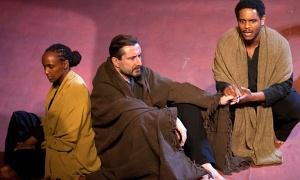Battlefield
There's a distinct aesthetic harmony to Peter Brook's production that feels not only refreshing in the context of current West End fare, but also allows for a mostly clear understanding of this important and timely production. Adapted from Brook's epic Mahabharata which initially opened thirty years ago, this ancient Sanskrit text has been adapted further into a more manageable and contemporary 70 minute version that finds a suitably relevant narrative.
Brook and Marie-Hélène Estienne portray a somewhat apocalyptic post-war exploration of rival family members confronting the nature of victory and defeat, led by the King Yudhishthira who struggles to comprehend war and its affects on both his family and wider society. The cyclical nature of war and suffering is highlighted, although not overly pointed, and the whole drama oscillates from one story or parable to the next which keeps the motion flowing.
The acting suits the nature of the piece, with just four performers and one musician bringing the stories to life with minimal effort - different coloured shawls transform them into new characters, and each story is presented with the same effort quality, pacing and intonation. At times I found it too relaxing and longed for a shift in pace and tempo to match the nature of the text, which projects its themes of the futility of war and cycle of human destruction in a calm and matter-of-fact way.
The staging screams trademark Brook and is enchantingly simple, yet continually surprising. A burnt orange playing space with scattered bamboo canes act as the only elements of set, and these are used to tell stories of different animals and humans with just the slightest movement. A story about a worm attempting to cross the road is told with a rolled up scarf, that seems both overly simple yet genius at the same time.
That said, at times there's more than a whiff of 'Emperor's New Clothes' syndrome, Brook's formidable shadow hangs over the piece so firmly that you can't help wonder if audiences would respond the same way were his name not attached as a seal of approval. It's certainly different to recent productions at the Young Vic, and seemed to leave many of the audience, myself included, somewhat baffled. The broken silence at the end of the play by the audience member who takes it upon themselves to begin the applause in a knowing "I've understood this more than you" way perhaps best sums up the evening. Make sure you find them in the bar afterwards to ask for a full explanation.
s beautifully controlled and intelligent production is all shifting nuance and finely calibrated detail, from Hugh Vanstones subtle score to the faint drift of dry ice that intimates Hildes fatal otherworldliness and the remarkable nuances of physicality with which the actors embody their roles ..."
Dominic Cavendish for The Telegraph
"Fiennes delivers a terrifically compelling study of a man going out of his mind with fear and ineffectual remorse irascibly impatient and relentlessly negative about younger talent; haunted by the thought that he somehow willed the disasters that have paradoxically made his career."
Paul Taylor for The Independent
"Mr Fiennes throws himself in to the part. Even when Ibsen makes little sense often it is possible to admire the Fiennes stage technique."
Quentin Letts for The Daily Mail
"... a production that edges towards the three-hour mark but speaks hauntingly about the dark heart of ambition and the madness of desire."
Henry Hitchings for The Evening Standard
External links to full reviews from popular press
Guardian - Telegraph - Independent -->
Originally published on
